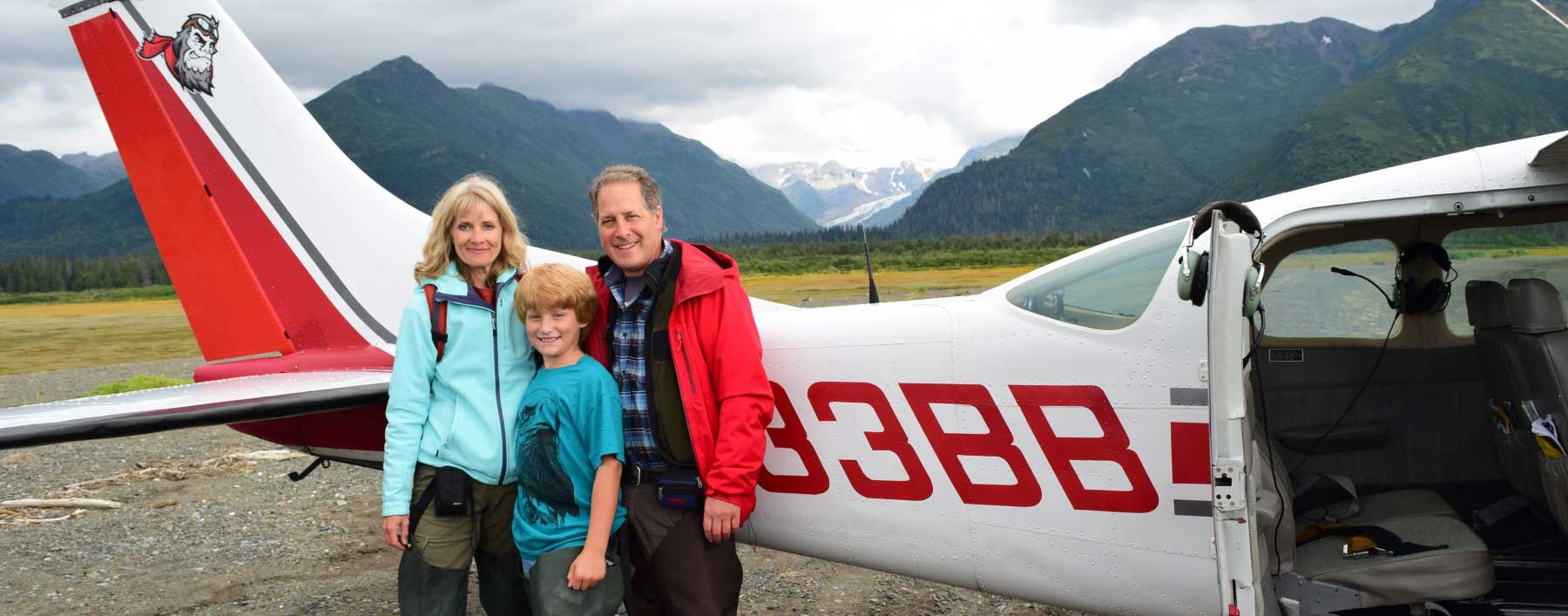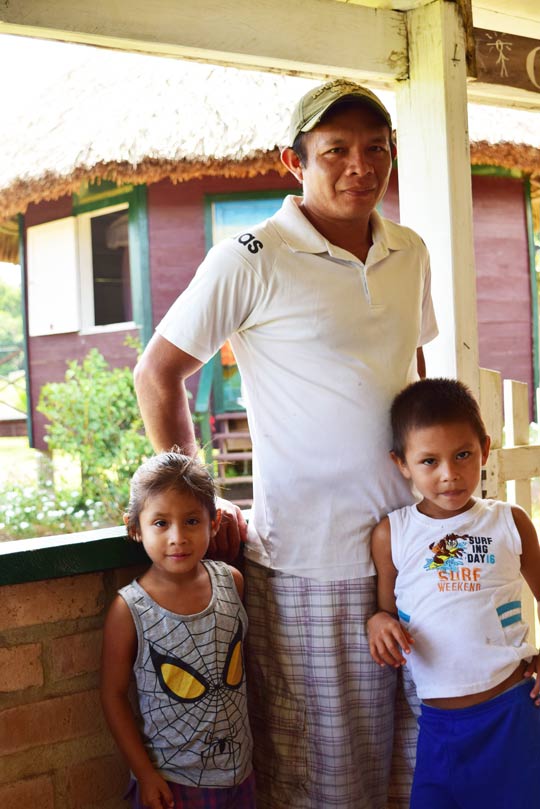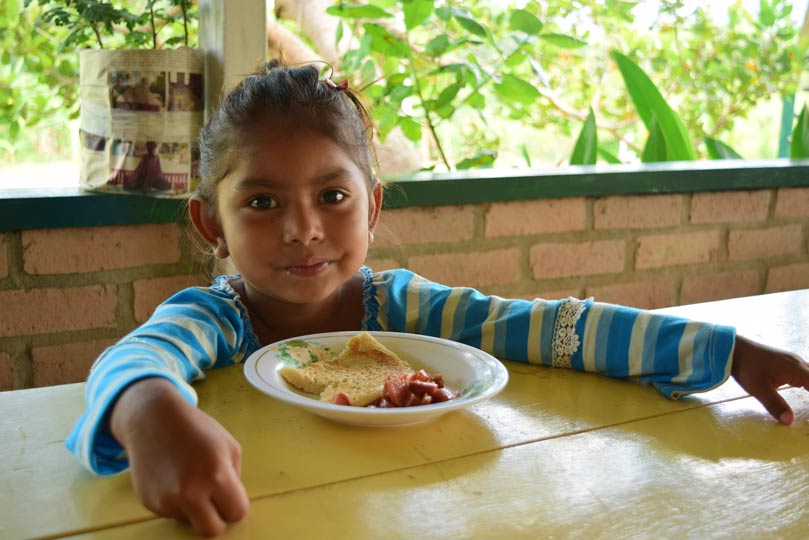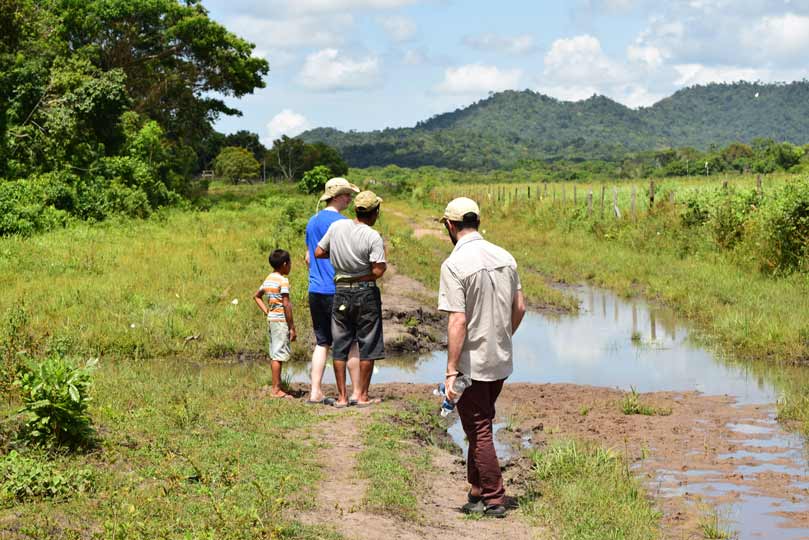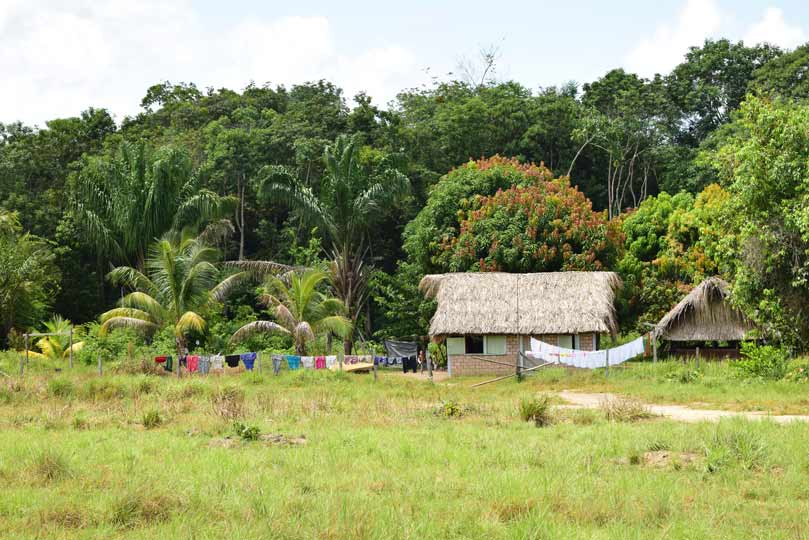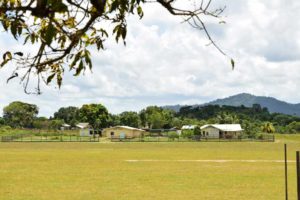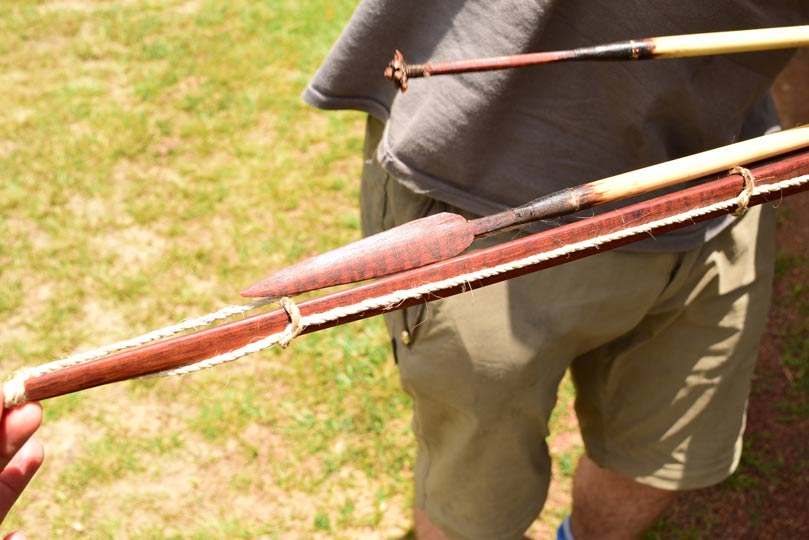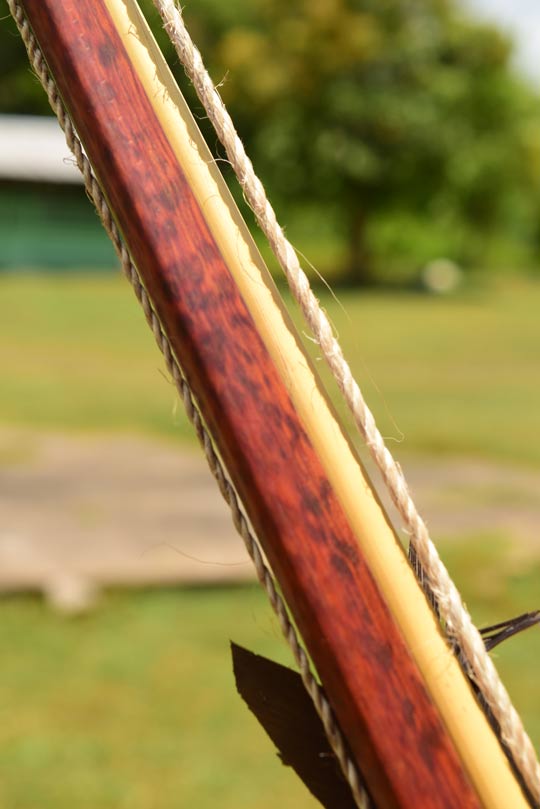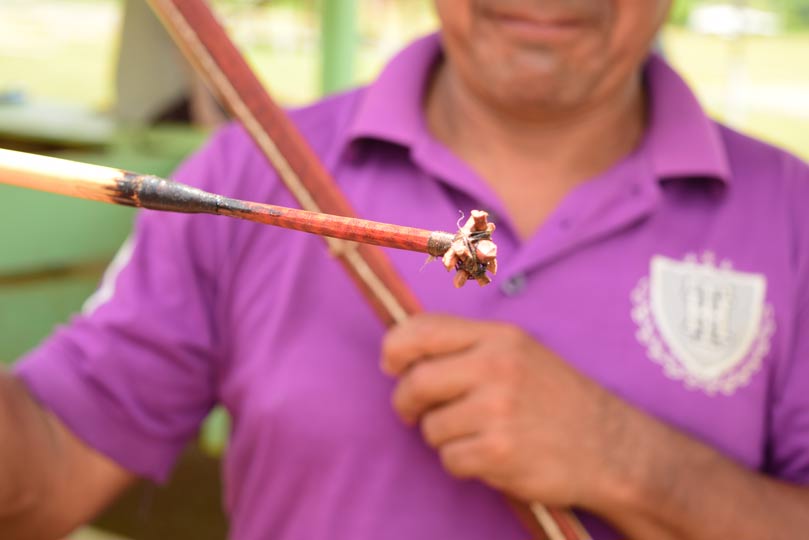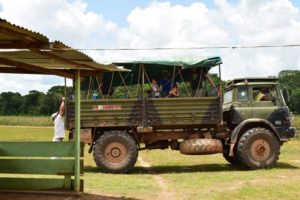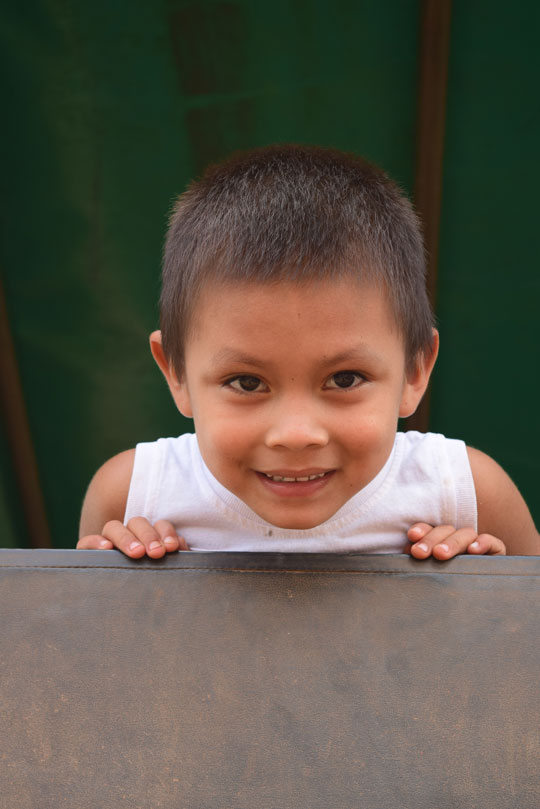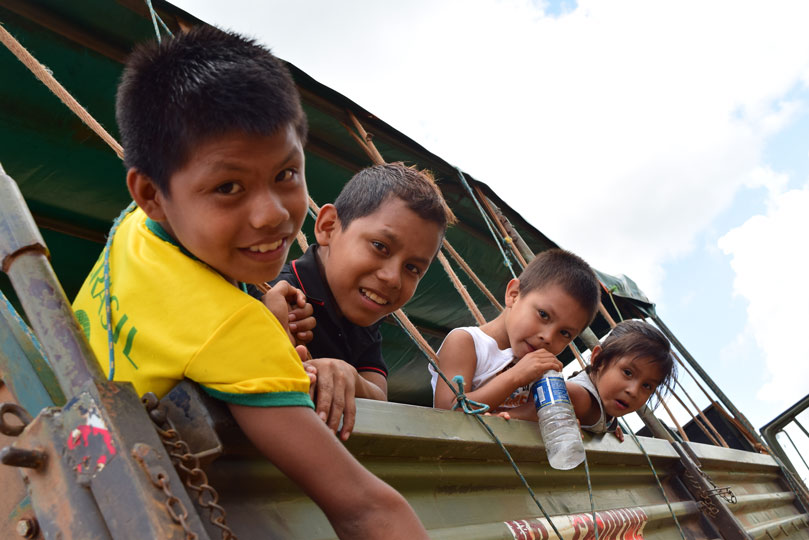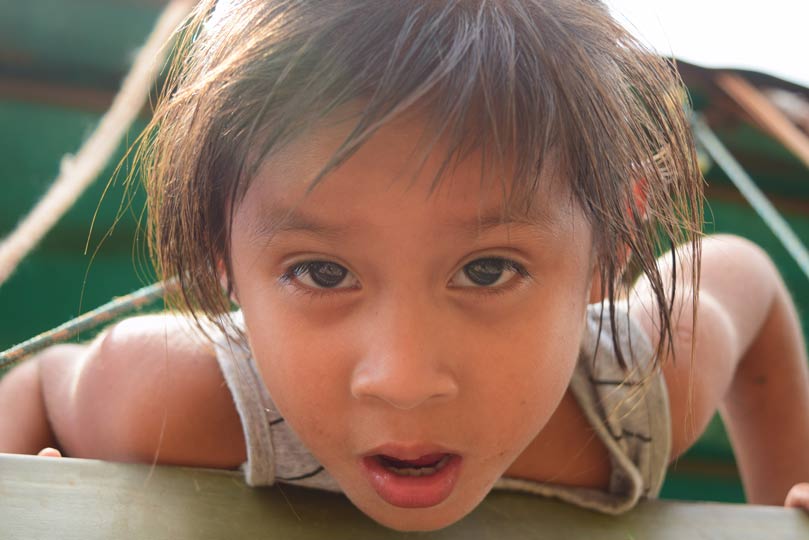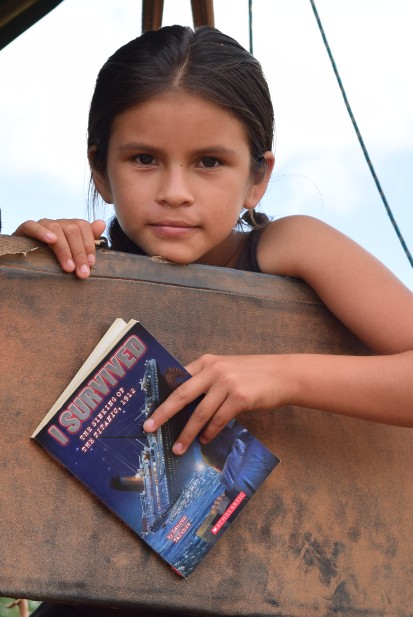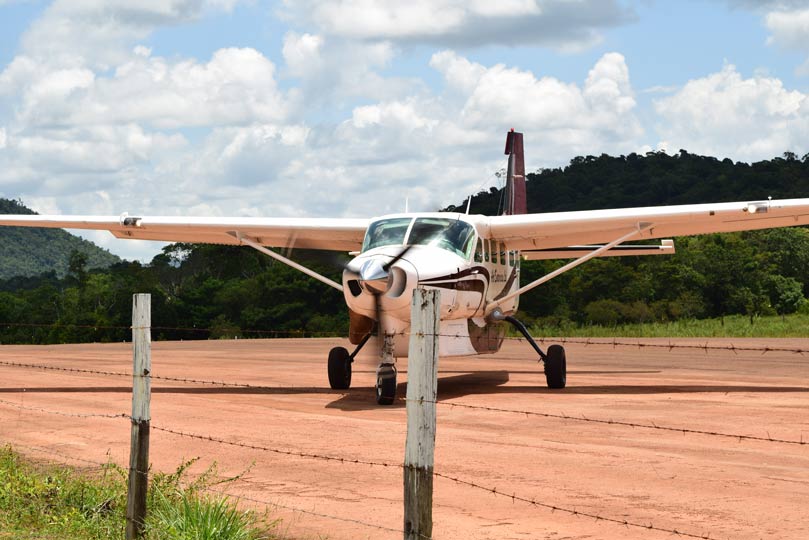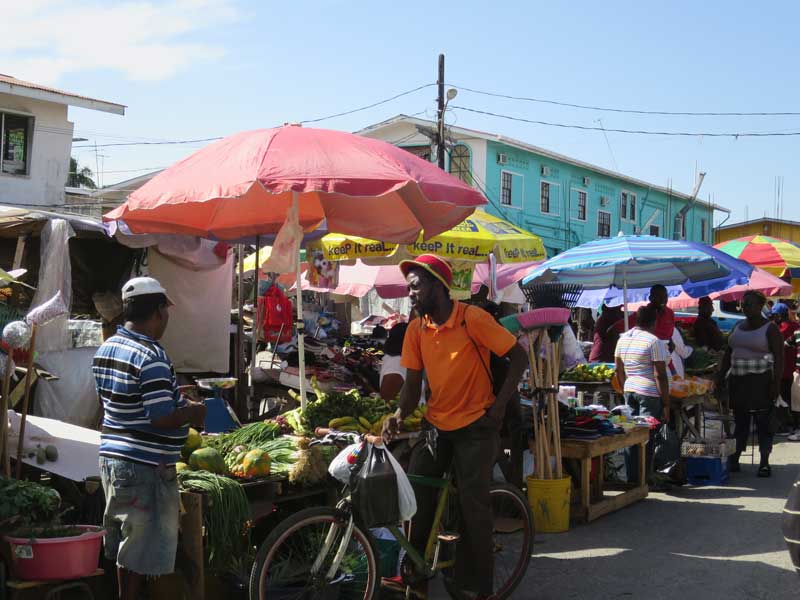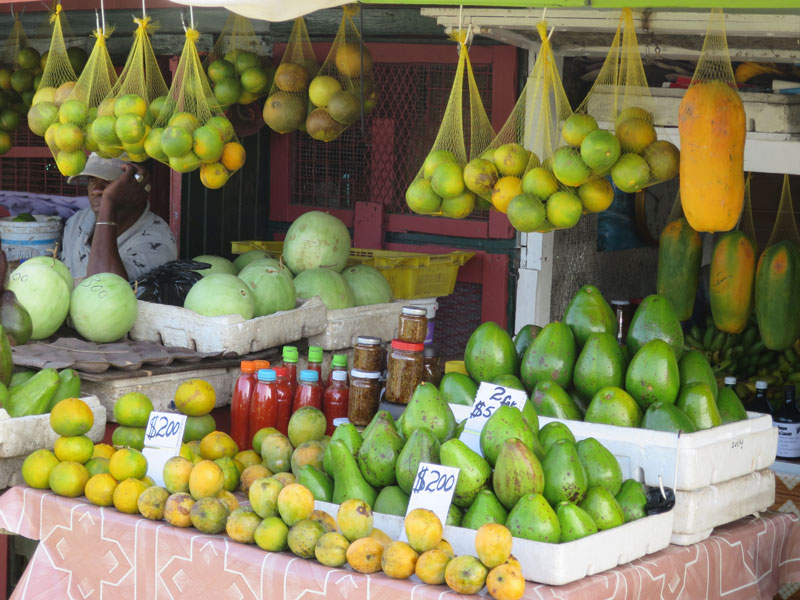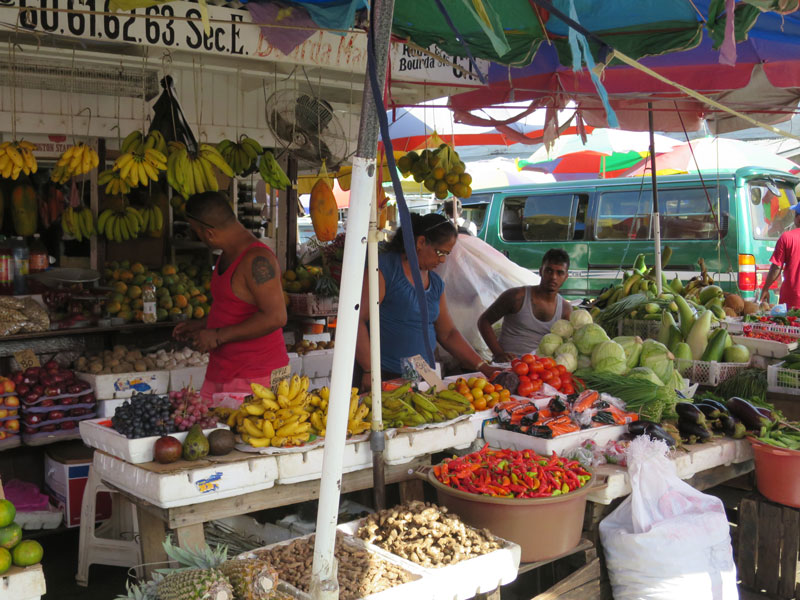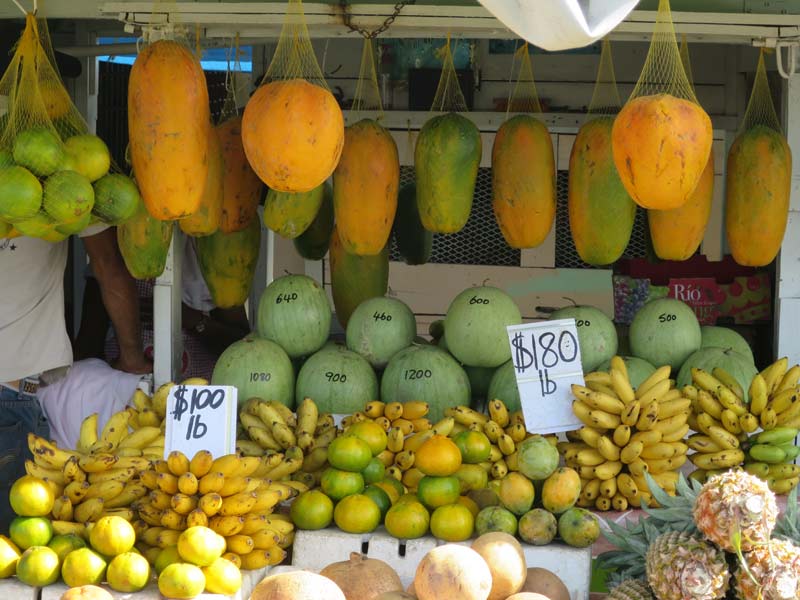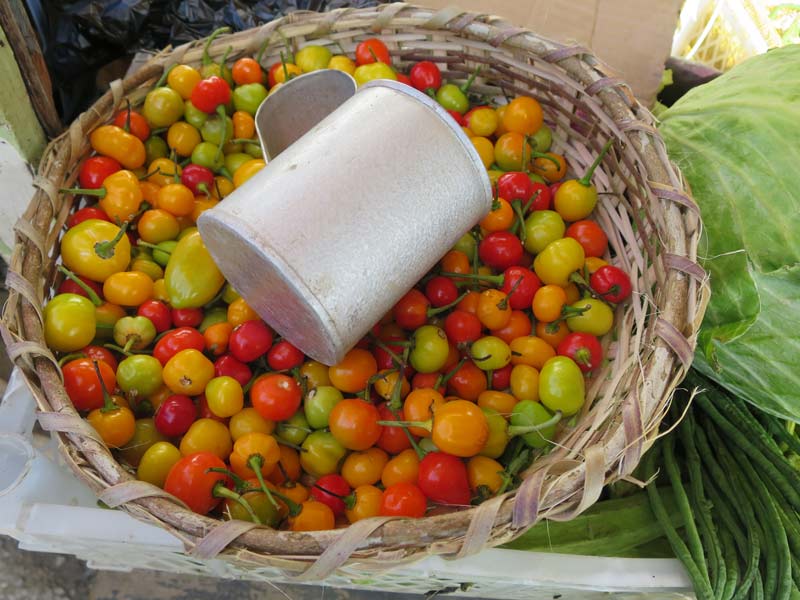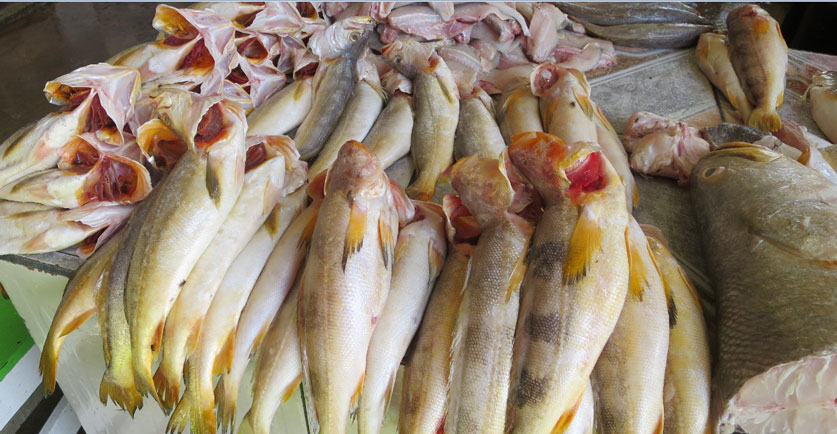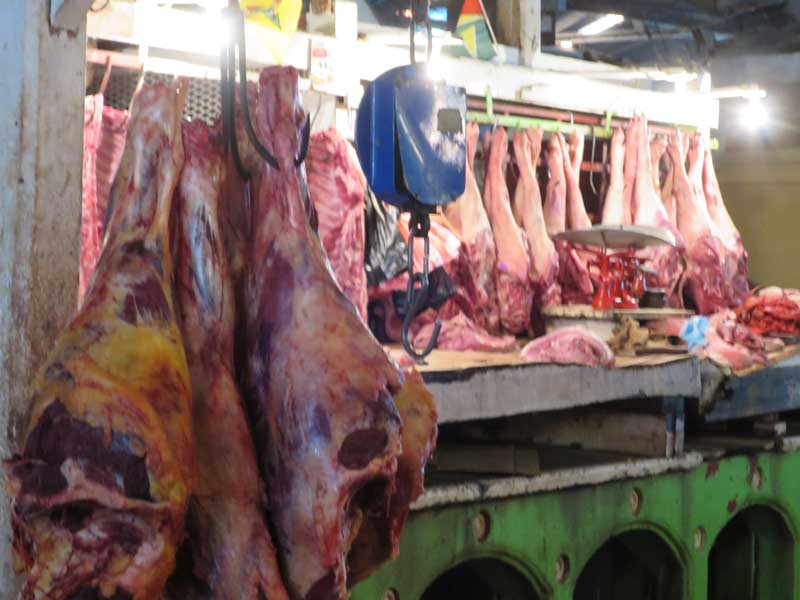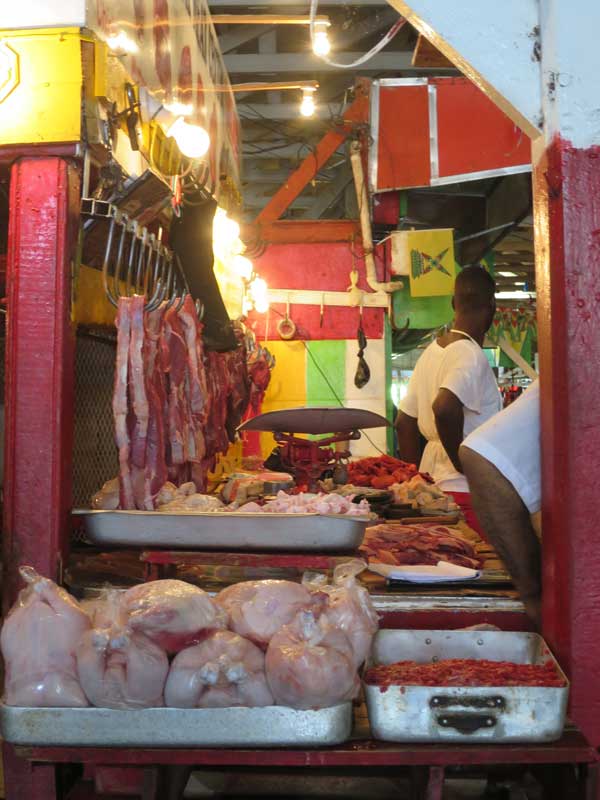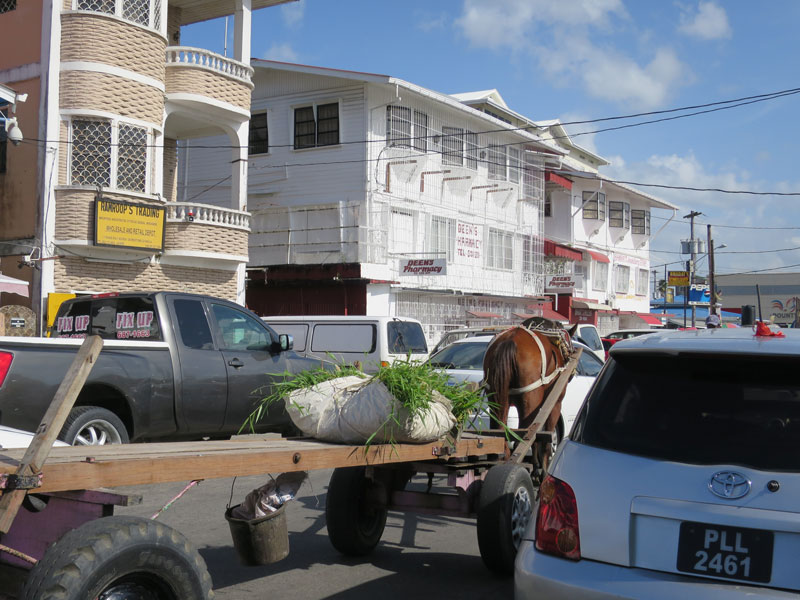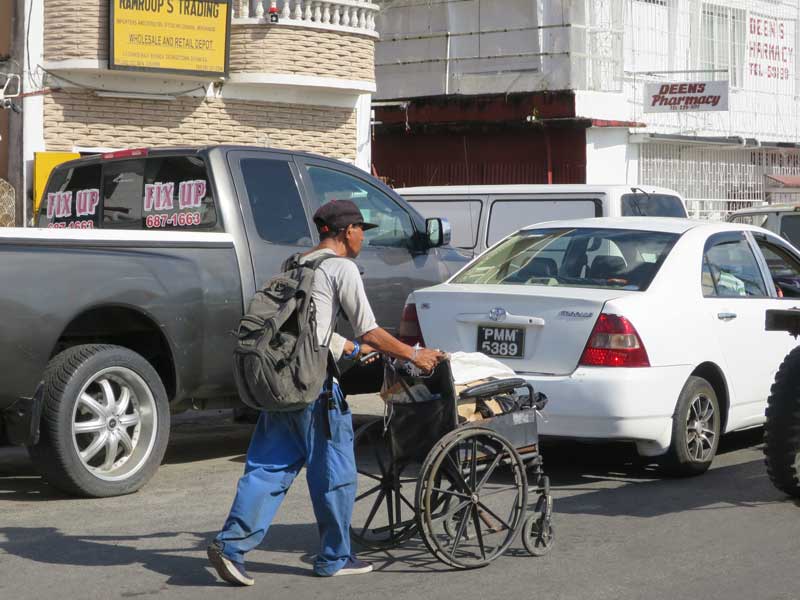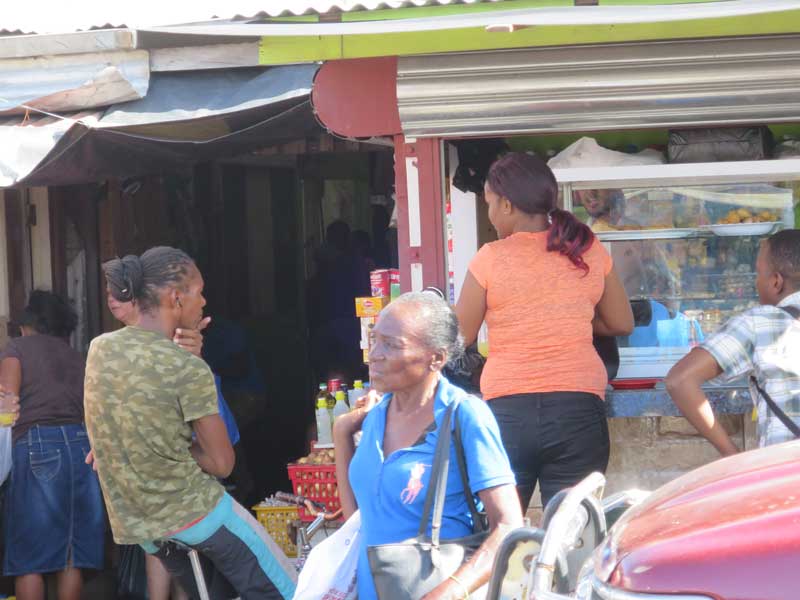This morning, we have a celebratory breakfast with sausage, fried plantain spears, farine bread and pancakes with killer bee honey (yup, local killer bee honey — tastes good!).
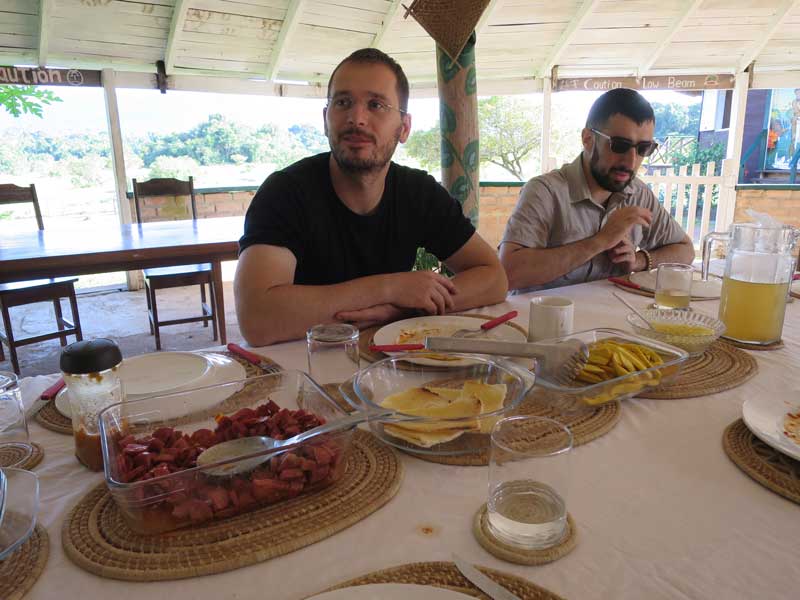
After breakfast, we pack up our stuff and set out one more pile of things we’re leaving for the people in the village. I am leaving all my remaining food and candy, my medical kit, ziplock bags, my headlamp, spare batteries, several shirts, my crocs. My bag is pretty light and empty when I drop it in the luggage pile at the lodge. The truck will bring our luggage to the airstrip later. In the meantime, Derrick will walk us through the village and show us everything.
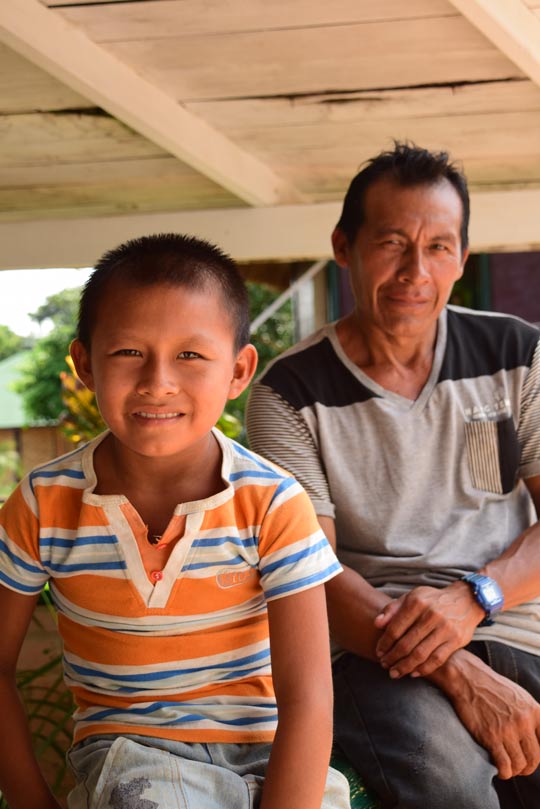
Derrick and his 9-year old son
Going to the village is another long walk in the hot sun, but much easier this time since there is no 40+ pound ruck on my back! I chat with Derrick to learn more about life in such a remote community.
The BBC program last night said that the Makushi were not wearing any clothes until about 7 years ago. They look very comfortable in clothes now, so not sure if that is actually true, but it is true that they live incredibly isolated lives. No phone, no internet, not even a radio. There is apparently a satellite phone connection for emergencies, but not available to the villagers.
During dry season, Georgetown is a 12 hour truck ride away. During rainy season, the only way in or out of Surama is by plane. But, there is no regularly scheduled service. The only planes coming in are chartered planes, at US$2000 a pop.
Oh yeah, no mail either! Basically, we can’t send the guys anything, no email, letter or package. And, we’re told, even if we were to send something to someone in Georgetown who could eventually bring it to the village, it would never make it: customs would go through and pick out anything nice and keep it for themselves.
I ask what happens if someone gets seriously hurt, beyond the capabilities of the health clinic. Derrick explains that they would take the person by car to the next village, and that village does have air service, twice a week. Nothing here is easy. Or fast.
There is one little building in the village, shuttered now, that serves as the store. I ask Derrick when the store is open, but he’s a little vague on that. It’s where they can buy clothes, and food and tools. Given that it’s the size of the average 7-11, I wonder how much inventory they can really carry.
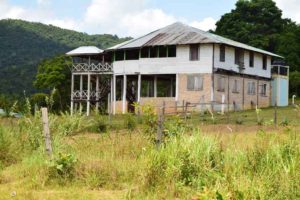 There’s a community center that usually houses the projector screen (“sometimes we watch videos”), the town hall building where the “village captain” (mayor??) has his office, a health center (“for checkups and shots”) and the schools: a nursery school and a primary school for grades 1-6.
There’s a community center that usually houses the projector screen (“sometimes we watch videos”), the town hall building where the “village captain” (mayor??) has his office, a health center (“for checkups and shots”) and the schools: a nursery school and a primary school for grades 1-6.
After 6th grade, the kids have to go to another town, to a boarding school. I ask Derrick how much the boarding costs but he doesn’t know – most people board their kids with relatives rather than at the school. The children come home only during holidays. Derrick tells me that his first language is Makushi, but that he feels more comfortable in English. I have to really beg him to say something in Makushi, and he doesn’t want me to record him.
We hang out at the soccer/cricket field at the school, near the airstrip, until our plane comes. Lionel comes over to meet us: he has made a bow for C, with different types of arrows for birds and for mammals. It’s a beautiful bow made from leopard wood.
A little later the truck arrives with our luggage and a few of the kids who want to see us off.
They’re on their last week of school vacation and our visit is the most exciting thing they’ve seen all week.
One of the girls has brought a book she is reading – I am happy to see it’s one of the books I brought and left at the lodge yesterday (one of the “I Survived” series books). She’s almost halfway through it already. In hindsight, I wish I had brought my kindle so I could leave it behind. Or more books. Next time!
The plane is a little late but once it comes, we get on quickly and wave goodbye to Lionel, Derrick, Roy and all the kids, as well as to O, who is staying behind for a jungle hunting trip with Roy and another Amerindian, and who will then participate in Ian’s extreme survival course in 2 weeks (7 days of iso and navigating through the jungle on your own!). I get to sit next to the pilot and take lots of pictures again. The flight back seems really short – before we know it, we’re back at Ogle. Strangely, we have to go through customs. Why?? Maybe they don’t monitor which flight arrives from where? But they don’t even ask us any questions…weird. Ian pays for cabs to take us back to the hotel where we check in. He is getting the stuff we left with him from his apartment and brings it to the hotel.
I have a few hours before I have to leave for the airport. Several of the guys need to go to the ATM at the Nova Scotia Bank (Ian says go only to this bank to get cash). B and I decide to go for a little walk, instead, and see the open market. It’s only about 5 blocks from the hotel. Interesting, colorful, lively, it feels safe during the day, but I wouldn’t come here late, nor would I feel entirely safe alone.
The people are friendly enough, but at almost every stand I get the once over – from guys anyway, but also from the women. Yes, my “international travel” outfit is new and clean, but still vaguely safari looking, not the typical tourist look. And certainly not what women here are wearing (curve-conscious clingy tops and skirts).
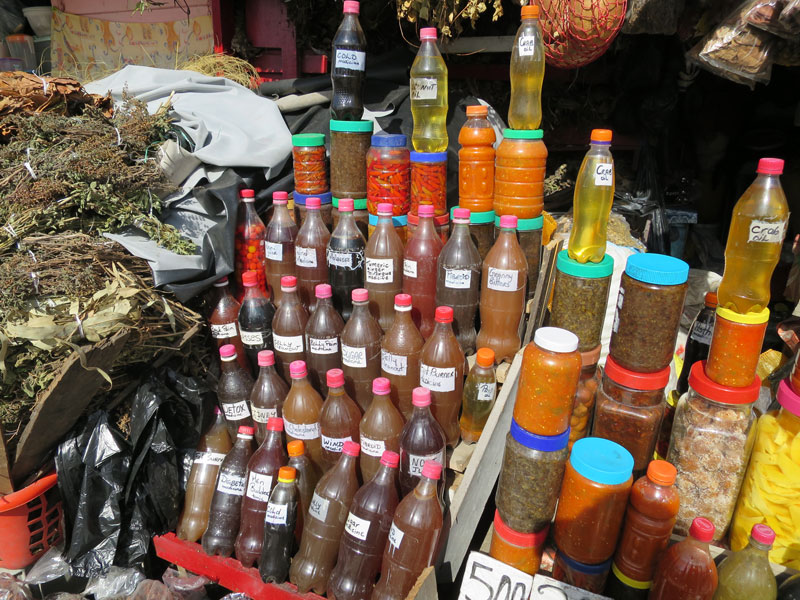
what looks like river water to me is actually “wind medicine”, “back pain medicine,” “belly cleanout” and “men builder” tonic
After checking out all the stalls of fruits and vegetables (never seen so many bananas in one place!), and spices and medicines (I love how the owner of this one stall takes old coke bottles and fills them with a liquid that looks suspiciously like the river water we’ve been drinking, but they all have different labels, promising to cure various interesting–sounding ailments), we venture into the market hall building.
The market hall building has a few really narrow, really dark aisles that look scary to me (the kind of aisle where you go in and wake up hours later with one of your kidneys missing), so we avoid those and go for the better lit main aisles: MEAT! Lots of little stalls, each with its own meat selection: some have bowls with cut up pieces of meat (for stew?), others have whole cow hindquarters hanging from hooks. Nothing is cooled and it’s about 95 degrees outside.
I hope the group gets their dinner cooked well-done at the Brazilian BBQ tonight!! One of the fish vendors pulls some of her more exotic fish out of her ice chest, for us to look at and for me to take pictures of.
Everybody wants to know where we’re from and whether we’re enjoying Guyana. Interestingly, their first guess for our home country is always Australia. Not sure why. Maybe not a lot of Americans come here? I’m chatty and friendly and everyone is engaging in return.
Eventually, we go back to the hotel and I have a quick dinner at the restaurant downstairs. Then it’s time for me to say goodbye to the group. I’m sad that I’m missing the group dinner! They all leave to go to a restaurant to meet Ian, and I take a cab to the airport. My driver is a chatty guy whose two daughters both live in the US, and who has a sister-in-law in New Jersey. We talk the whole way to the airport. Really nice guy.
He drops me right in front of the terminal and I walk up to the door. The terminal is deserted, with only a security guard sitting on a barstool at the door, and a janitor pushing a broom in a corner. “Excuse me, I’m here to check in for my flight?” “Oh, the Fly Jamaica one? Yeah, that got canceled. They combined it with the afternoon flight. It left at 6:00.”
WTF? I look at her like she’s from Mars. My flight left early because it was combined with an afternoon flight? And nobody contacted me? She tells me that I should hold my cab, first of all, and then maybe check with the airline office. “They might still be there.” The nice cab driver says he’ll wait. And then I make my way past the baggage scanner, into what at an American airport would be a high security area, where I walk around counters, and peek behind a rickety wooden wall where several office doors are and I finally open the right one.
The airline agent confirms that the flight left early. I ask her if she can re-book me on tomorrow’s flight. The conversation goes something like this:
her: “I don’t have the schedule yet.”
me: “But you will HAVE a flight tomorrow, right?”
her: “I don’t know yet. I don’t have the schedule yet.”
me: “When will you have the schedule?”
her: “I’m not sure. Maybe tomorrow.”
me: eyeroll…
She suggests that I call their customer service agents at the numbers she’s giving me. I ask her how those people can possibly help me: she’s the airline representative and she doesn’t even know when the next flight is going to be! She doesn’t directly acknowledge that point, but now volunteers that I can book a flight through another airline “Fly Jamaica has a full refund policy.” I wonder why!
Sadly, the Caribbean Airlines office is now closed. I guess I have no choice but to go back to Georgetown. I had just enough cash to get me to the airport and a little extra for the airport tax and some snacks, so I barely have enough to give to the cabbie. I tell him that but he says not to worry.
On the way to town he stops to pick up his wife and her co-worker from their shift. I make small talk with his wife. Eventually we get to my hotel and I give him my last $20. He looks at the money and hands me back $10 and tells me it’s alright and that he hopes I’ll make it home safe tomorrow.
Finding out about my flight sucked, but meeting this cab driver was a really good experience. I’m a little annoyed at the hassle of it all, but also kind of happy since I wasn’t really ready to leave yet.– I missed the group dinner, but the gang is sitting in the bar of the hotel and we have a fun evening talking about the trip, and lots of other topics. Eventually the group breaks up: several people have early flights to catch.
Click here to find the full list of posts: My Jungle Adventure
